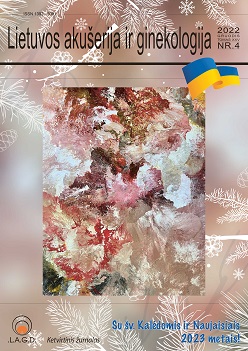MENSTRUAL HYGIENE CHALLENGES OF SCHOOL-AGE GIRLS IN VILNIUS
Abstract
Aims. To determine menstrual hygiene habits of girls living in Vilnius and sanitary conditions, sufficiency of education in their schools. Methods.An anonymous survey was conducted in 4 schools of Vilnius from April to May, 2021. Statistical data analysis was performed using MS Excel 2016 and IBM SPSS Statistics programmes. Fisher’s exact criteria and Chi square test were used for statistical relation analysis. Statistical significance wasset at p < 0.05. Results. There were 170 girls, aged 11–17, who participated in the survey, 110 respondents had already reached menarche. Most of the girls choose to use disposable menstrual hygiene products due to comfortability, family habits and price. About half of the schools’ toilets are not suitable for adequate menstrual hygiene. 92 % of girls stated not to have access to hygiene products in their schools. More than a third of the respondents skip classes at least once a year due to menstruation, half of them skip physical education during every menstrual cycle. Main sources of information about menstruation are parents, the internet and friends. Statistically significantly more respondents believed that the information about menstruation provided in schools was not sufficient and they would like to be taught more (p < 0.05, χ2 = 21.42). Conclusions.Insufficient education, menstrual hygiene produce unavailability and inadequate sanitary conditions were found in several schools of Vilnius.

